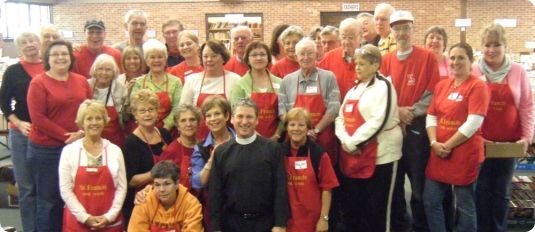Greensboro Mega Book Sale Benefits Those Near and Far

Each spring for the last 50 years, avid readers and book collectors in Greensboro, North Carolina, have eagerly awaited the event of the year: the St. Francis Episcopal Church book sale.
One of the largest book sales in the South, the three-day event is a win-win for everyone involved. Not only can book lovers choose from thousands of volumes at bargain prices, but the church uses all sale proceeds—almost a half million dollars since 2000—to support local and international charitable organizations.
According to a history of the sale by St. Francis member Ann Oakley, the event has come a long way since it began in 1958. One day, as she and other women from the church were “casting about for other ideas to raise more money” than their usual bake sales, Ann recalled the yearly book sale she attended while growing up. She proposed the idea and the other women agreed to try it.
Since that first effort—which brought in more than $350, twice as much as the bake sales—the book sale has grown exponentially. Today, the event culminates a yearlong process that unites the whole parish, said Darlene Ball, who serves as a sale chair along with Melissa Harrelson and Beth Lynch. Each year, she said, “We start back to work right after the book sale ends.”
For the 2010 sale, the collecting and sorting began in May 2009. Parish members—more than 250 total—log many hours week in and week out to sort through donations. According to Melissa, the first step is weeding out damaged books and those unlikely to sell (for example, textbooks and old Reader’s Digests). Those that pass are separated into categories, including “select,” which bring the most sales, and old/rare books.
A week or two before the sale, work begins in earnest. Volunteer coordinators Lesley Cahalan and Susan Tysinger slot 100-plus people into various roles: movers, lifters, sellers, money counters. “We probably have 800 to 1,000 people come through the doors during the three days,” Darlene said. Well before the sale begins each morning, shoppers begin lining up. Most offerings (more than 90,000 this year) are priced at $4.oo and under; on the last day, shoppers can fill a bag for $8.00.
After the final sale is made, the volunteers collect any leftovers. “We try to use or recycle as many books as possible,” Melissa said. “We start again from scratch each year.” In the past, the remaining books have been donated to prisons, children’s homes and other organizations; this year, a secondhand bookstore owner bought all the leftovers. That arrangement added extra profits and also saved volunteers the trouble of figuring out what to do with them.
Once the dust has settled, the St. Francis Outreach Committee donates the income to a variety of local and global causes. Each year since 2002, Episcopal Relief & Development has been blessed to receive a portion of the proceeds, including some designated to help those affected by the January 2010 Haiti earthquake.
As Ann Oakley points out in her history, St. Francis parishioners can take pride in the book sale as an institution that serves the community in a number of ways. In addition to providing an environmentally friendly alternative for countless books that might otherwise end up in a landfill, the sale offers quality books at affordable prices, especially for those of limited means. “We get many comments confirming this,” Darlene said.
Not least, Ann concludes, “Just think of the good St. Francis has been able to do in the community with the book sale proceeds. Think of all the people who have been helped in some way with the thousands and thousands of dollars we have been able to contribute to so many good causes since 1958.”
Those people include many who have been assisted through Episcopal Relief & Development’s programs to fight poverty around the world. It’s the support and prayers of dedicated and compassionate parishes like St. Francis that enables this work to continue.


